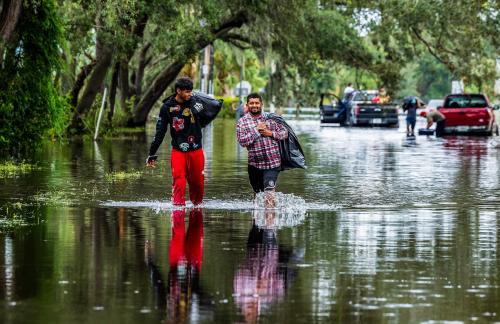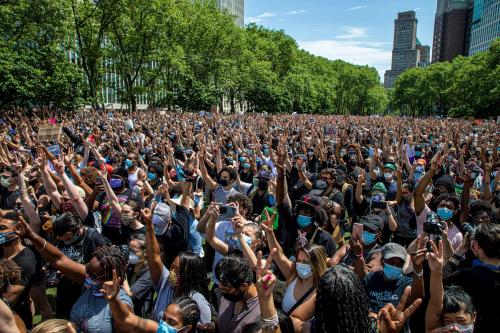Iranians went to the polls last week in the first national election since the July 2015 signing of the nuclear deal, and like so many aspects of Iran, the outcome was ambiguous, with partisans from divergent factions claiming success. The one clear winner, at least symbolically, was President Hassan Rouhani, as high turnout and a decisive win in Tehran for the slate he supported vindicate his centrist approach and the tactical alliance that he has nurtured with Iran’s embattled reform movement.
No one should expect the ballot to produce transformational change in the Islamic Republic or its policies; the structure of power in today’s Iran makes that impossible. However, the vote does suggest the possibility of a new force in Iranian politics, a durable coalition of moderates that can claim both popular support and traction among the system’s power brokers. That would not be a ticket to overnight improvements in Iran’s most problematic policies, but it could curb some of the regime’s ideological excesses and create a pathway for sustained, meaningful progress for the first time since the 1979 revolution.
No one should expect the ballot to produce transformational change in the Islamic Republic or its policies.
In Washington, where Iran’s politics still begin and end with their implications for the nuclear deal, there is a temptation to presume the success of the moderates is a testament to U.S. diplomatic outreach. That has it a bit backwards: Iranians rewarded the long-deferred courage of their own leadership to engage with Washington. And for what it’s worth, the nuclear deal has never been in any serious jeopardy on the Iranian side—witness, for example, its lightning-fast approval by the previous parliament and Tehran’s surprisingly swift implementation of its terms.
How we got here
In the short run, the election appears to have nudged the overall partisan balance in the parliament distinctly away from hardliners and toward what constitutes the political center within the Islamic Republic. Candidates from the “List of Hope”—backed by the president—took all 30 parliamentary seats in Tehran, the country’s largest and most competitive electoral district. Mohammad Reza Aref, a reformist whose decision to withdraw from the 2013 presidential election sealed Rouhani’s bid in that race, topped the Tehran vote. And 15 of the 16 candidates that Rouhani’s camp supported for the Assembly of Experts (an obscure clerical body empowered to appoint the country’s supreme leader) also won.
The government’s supporters didn’t simply win; they knocked out a string of conservative heavyweights in the process.
The government’s supporters didn’t simply win; they knocked out a string of conservative heavyweights in the process. Gholam-Ali Haddad Adel, a former speaker of the parliament whose daughter is married to the influential son of Iran’s supreme leader, finished a frustrating 31st in the Tehran parliamentary race. And two towering figures in the hard-line camp—Ayatollah Mohammad Yazdi and Ayatollah Mohammad Taqi Mesbah Yazdi—found themselves voted out of the Assembly of Experts. Yazdi’s long hold on leadership positions (he chairs the current Assembly) and Mesbah’s public rancor toward democracy gives their defeat an outsized importance for the wide swath of Iranians who want political (and generational) change.
The outcome also offered an unambiguous nod to the abiding importance of Mohammad Khatami, whose 1997 election ushered in the era of reform. He left office eight years later amidst frustration over his stalled reform program, but has since reclaimed a popular mantle of moral leadership thanks in part to his quiet sympathies with the protest movement that erupted after Iran’s 2009 elections.
Although the media is prohibited from quoting him or broadcasting his image, Khatami’s video message encouraging Iranians to “vote for a better Iran” is widely credited with both the strong turnout and the victory for his slate. It’s worth noting that Khatami’s behind-the-scenes role is perhaps even more consequential; it was his careful coalition-building during the 2013 presidential campaign that first crafted the alliance that produced Friday’s victory in Tehran.
In addition to Khatami, another long-time Iranian power broker, former president Ali Akbar Hashemi Rafsanjani, received more votes in his bid for the Assembly of Experts than any other candidate for that body (or for parliament), as University of South Florida professor Mohsen Milani has noted. After extraordinary fluctuations in his stature over the years, the 81-year-old Rafsanjani seemed emboldened by his apparent restoration, bristling in a statement that the elections demonstrate “no one is able to resist against the will of the majority of the people and whoever the people don’t want has to step aside.”
For many external observers, the rout in Tehran had tended to overshadow a much more variegated verdict around the country. The precise factional breakdown in the forthcoming parliament remains contested, in part because factional identifications are fluid (several of the 30 winning candidates in Tehran were endorsed by multiple lists) and in part because 62 seats will go to run-off elections in late April. Overall, conservatives did well in many districts, helped in some places by the disqualifications that eliminated competition. But the elimination of several of Rouhani’s most voluble critics in the parliament and the apparent shrinkage among the hard-line contingent within the conservatives should modulate the relationship between the executive branch and parliament.
Hold the celebrations
The strong showing of the moderate camp in the election provoked a flurry of excitement in some corners, particularly as some reports have erroneously described the election as a “reformist victory.” In fact, it’s difficult to foresee any tangible impact of this vote—positive or negative—in the near term. Iran’s parliament is a vibrant institution, but it has been distinctly subordinated to the unelected elements of the revolutionary state. Even the sixth parliament (2000-2004), with a reformist majority operating during Khatami’s presidency, found its efforts at strengthening representative institutions and government accountability totally stymied by the veto authority of the Guardians’ Council, an unelected leadership body that has always skewed strongly conservative.
[S]ome reports have erroneously described the election as a “reformist victory.”
In addition, it is unclear whether the tactical alliance that produced the joint “List of Hope” for this ballot will extend to a common agenda or strategy within the parliament. The fact that the ideological predilections among the Hope members of parliament effectively span the entire political spectrum—from those who advocate the release of the opposition leaders who inspired Iran’s 2009 protest movement to those who would have them executed—suggests that there will be real challenges to generating coordination around specific policy proposals once they assume office.
Expectations surrounding the other institution up for grabs last week—the Assembly of Experts, Iran’s purported instrument of managing leadership succession—should be even more restrained. Watching Mesbah—Iran’s conveniently cartoonish archenemy of democracy—go down at the ballot box must have been a thrill for reformists. Still, the vote for Assembly representatives was entirely about symbolism, since their positions are purely titular. The Assembly has long resisted episodic efforts by reformists to play a supervisory role over the sprawling office of the supreme leader, and the only occasion on which it was called into service—the death of Iran’s original supreme leader—it rubber-stamped the selection made by a couple of key power brokers behind closed doors. Something similar is likely to happen once again whenever Ayatollah Ali Khamenei passes from the scene. The composition of the Assembly is essentially irrelevant to that decision.
Iran’s recent history suggests that there is an even greater danger lurking. It is hardly inconceivable that Friday’s election could inspire a backlash. Ayatollah Sadeq Larijani, the head of the judiciary and one of several clerics who analysts point to as a potential successor to Khamenei, suggested that American and British media had influenced the outcome, asking: “Is this type of coordination with foreigners in order to push out these figures from the Assembly of Experts in the interests of the regime?” These comments cannot help but evoke memories of a speech Khamenei gave in April 2000, weeks after reformists had won a majority of seats in the parliament, when he denounced the country’s then-boisterous press as “bases of the enemy.” The speech came amidst a vicious crackdown that shuttered dozens of newspapers, dispatched dissidents and intellectuals into prison and exile, and ramped up violence.
What may contain the fallout is the reality that this is not a reformist parliament, but one in which the factional balance has been returned to a kind of equilibrium. In that sense, the ambiguity surrounding the precise composition is quite useful. The Islamic Republic’s general public can celebrate a sense of achievement, but the parliament will be in the hands of agents of the status quo. Candidates from the “List of Hope” may have won in Tehran, but in the slogan Rouhani adopted for his campaign and then his government—“prudence and hope” (تدبیر و امید )—prudence always comes first.
The Brookings Institution is committed to quality, independence, and impact.
We are supported by a diverse array of funders. In line with our values and policies, each Brookings publication represents the sole views of its author(s).



Commentary
Election fallout: What Iran’s vote means for hope and change (and Washington)
March 4, 2016